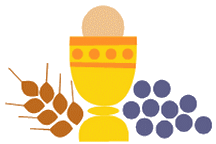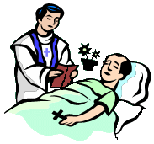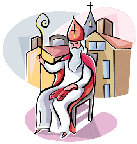Sacraments
The Sacramental Economy
1076 The Church was made manifest to the world on the day of Pentecost by the outpouring of the Holy Spirit.Cf. SC 6; LG 2. The gift of the Spirit ushers in a new era in the "dispensation of the mystery"—the age of the Church, during which Christ manifests, makes present, and communicates his work of salvation through the liturgy of his Church, "until he comes."1 Cor 11:26. In this age of the Church Christ now lives and acts in and with his Church, in a new way appropriate to this new age. He acts through the sacraments in what the common Tradition of the East and the West calls "the sacramental economy"; this is the communication (or "dispensation") of the fruits of Christ's Paschal mystery in the celebration of the Church's "sacramental" liturgy.
It is therefore important first to explain this "sacramental dispensation" (chapter one). The nature and essential features of liturgical celebration will then appear more clearly (chapter two).
The Pascal Mystery in the age of the Church
THE LITURGY—WORK OF THE HOLY TRINITY
1110 In the liturgy of the Church, God the Father is blessed and adored as the source of all the blessings of creation and salvation with which he has blessed us in his Son, in order to give us the Spirit of filial adoption.
1111 Christ's work in the liturgy is sacramental: because his mystery of salvation is made present there by the power of his Holy Spirit; because his Body, which is the Church, is like a sacrament (sign and instrument) in which the Holy Spirit dispenses the mystery of salvation; and because through her liturgical actions the pilgrim Church already participates, as by a foretaste, in the heavenly liturgy.
1112 The mission of the Holy Spirit in the liturgy of the Church is to prepare the assembly to encounter Christ; to recall and manifest Christ to the faith of the assembly; to make the saving work of Christ present and active by his transforming power; and to make the gift of communion bear fruit in the Church.
THE PASCHAL MYSTERY IN THE CHURCH'S SACRAMENTS
The whole liturgical life of the Church revolves around the Eucharistic sacrifice and the sacraments.Cf. SC 6. There are seven sacraments in the Church:
Cf. Council of Lyons II (1274) DS 860; Council of Florence (1439) DS 1310; Council of Trent (1547): DS 1601.The Sacramental Celebration of the Pascal Mystery
CELEBRATING THE CHURCH'S LITURGY
1136 Liturgy is an "action" of the whole Christ (Christus totus). Those who even now celebrate it without signs are already in the heavenly liturgy, where celebration is wholly communion and feast.
The book of Revelation of St. John offers insights to this eternal, heavenly liturgy. John describes events and participants in his vision of heavenly liturgy.
1139 It is in this eternal liturgy that the Spirit and the Church enable us to participate whenever we celebrate the mystery of salvation in the sacraments.
LITURGICAL DIVERSITY AND THE UNITY OF THE MYSTERY
1200 From the first community of Jerusalem until the parousia, it is the same Pascal mystery that the Churches of God, faithful to the apostolic faith, celebrate in every place. The mystery celebrated in the liturgy is one, but the forms of its celebration are diverse.
Although liturgical tradition may vary, the sacraments maintain fidelity to apostolic Tradition and the catholicity of the Pascal mystery.
The Seven Sacraments of the Church
1210 Christ instituted the sacraments of the new law. There are seven: Baptism, Confirmation (or Chrismation), the Eucharist, Penance, the Anointing of the Sick, Holy Orders, and Matrimony. The seven sacraments touch all the stages and all the important moments of Christian life:Cf. St. Thomas Aquinas, STh III, 65, 1. they give birth and increase, healing and mission to the Christian's life of faith. There is thus a certain resemblance between the stages of natural life and the stages of the spiritual life.
1211 Following this analogy, the first chapter will expound the three sacraments of Christian initiation; the second, the sacraments of healing; and the third, the sacraments at the service of communion and the mission of the faithful. This order, while not the only one possible, does allow one to see that the sacraments form an organic whole in which each particular sacrament has its own vital place. In this organic whole, the Eucharist occupies a unique place as the "Sacrament of sacraments": "all the other sacraments are ordered to it as to their end."St. Thomas Aquinas, STh III, 65, 3.
The Sacraments of Christian Initiation
THE SACRAMENT OF BAPTISM
 |
Then Jesus approached and said to them, "All power in heaven and on earth has been given to me. Go, therefore, and make disciples of all nations, baptizing them in the name of the Father, and of the Son, and of the holy Spirit, teaching them to observe all that I have commanded you. And behold, I am with you always, until the end of the age." Mt 28:18-20 Peter [said] to them, "Repent and be baptized, every one of you, in the name of Jesus Christ for the forgiveness of your sins; and you will receive the gift of the holy Spirit. For the promise is made to you and to your children and to all those far off, whomever the Lord our God will call." Acts 2:38-39 |
THE SACRAMENT OF CONFIRMATION
 |
When the time for Pentecost was fulfilled, they were all in one place together. And suddenly there came from the sky a noise like a strong driving wind, and it filled the entire house in which they were. Then there appeared to them tongues as of fire, which parted and came to rest on each one of them. And they were all filled with the holy Spirit and began to speak in different tongues, as the Spirit enabled them to proclaim. Acts 2:1-4 As they prayed, the place where they were gathered shook, and they were all filled with the holy Spirit and continued to speak the word of God with boldness. Acts 4:31 |
THE SACRAMENT OF THE EUCHARIST
 |
Jesus said to them, "I am the bread of life; whoever comes to me will never hunger, and whoever believes in me will never thirst." Jn 6:35 While they were eating, Jesus took bread, said the blessing, broke it, and giving it to his disciples said, "Take and eat; this is my body." Then he took a cup, gave thanks, and gave it to them, saying, "Drink from it, all of you, for this is my blood of the covenant, which will be shed on behalf of many for the forgiveness of sins." Mt 26:26-28 |
The Sacraments of Healing
THE SACRAMENT OF PENANCE AND RECONCILIATION
 |
And so I say to you, you are Peter, and upon this rock I will build my church, and the gates of the netherworld shall not prevail against it. I will give you the keys to the kingdom of heaven. Whatever you bind on earth shall be bound in heaven; and whatever you loose on earth shall be loosed in heaven. Then he strictly ordered his disciples to tell no one that he was the Messiah. Mt 16:18-20 Therefore, confess your sins to one another and pray for one another, that you may be healed. The fervent prayer of a righteous person is very powerful. Jas 5:16 |
THE ANOINTING OF THE SICK
 |
Is anyone among you suffering? He should pray. Is anyone in good spirits? He should sing praise. Is anyone among you sick? He should summon the presbyters of the church, and they should pray over him and anoint [him] with oil in the name of the Lord, and the prayer of faith will save the sick person, and the Lord will raise him up. If he has committed any sins, he will be forgiven. Jas 5:13-15 |
The Sacraments at the Service of Communion
THE SACRAMENT OF HOLY ORDERS
 |
Every high priest is taken from among men and made their representative before God, to offer gifts and sacrifices for sins. He is able to deal patiently with the ignorant and erring, for he himself is beset by weakness and so, for this reason, must make sin offerings for himself as well as for the people. No one takes this honor upon himself but only when called by God, just as Aaron was. In the same way, it was not Christ who glorified himself in becoming high priest, but rather the one who said to him:
|
THE SACRAMENT OF MATRIMONY
 |
But from the beginning of creation, 'God made them male and female. For this reason a man shall leave his father and mother [and be joined to his wife], and the two shall become one flesh.' So they are no longer two but one flesh. Therefore what God has joined together, no human being must separate. Mk 10:6-9 |
Copyright © 2019 Bert McNamee, Harleigh, Pennsylvania. All rights reserved.
 Sunday, November 16, 2025
Sunday, November 16, 2025




